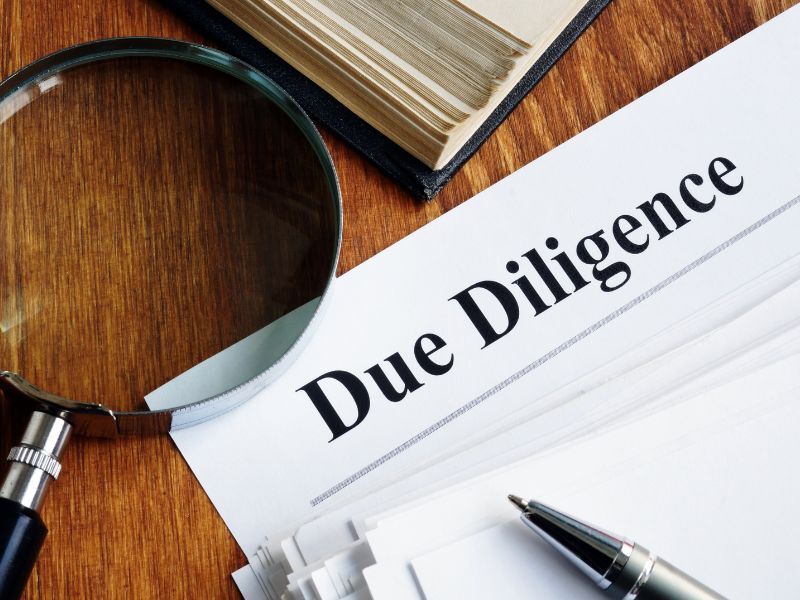What is due diligence?
Due diligence (DD) is the thorough review of pertinent information and documentation before proceeding with the sale or purchase of a company. It also involves asking and answering particular questions about the business at hand. Both the buyer and the seller have roles in the process. Due diligence can be as simple as a “book check” or as complex as a full consort of consultants and attorneys performing a detailed company analysis.
Relevant obligation
The greater part of the seller’s due diligence process is to assemble a business portfolio containing all the data they think the buyer may request. The seller ensures that all records are accurate and up to date. The data is then arranged in a way that presents the business as positively as possible. The other side of the seller’s due diligence is an investigation to establish the buyer’s financial ability and assess their personal and professional reputation. The seller also ascertains the reasons for the buyer’s interest in their company. This is especially important if a merger is involved or there will be a continuing relationship after the sale.
Sometimes, the due diligence process is done in two parts. The preliminary stage ends with both parties signing a term sheet or letter of intent. This sets a base price for the business, with the understanding that the actual selling price will be finalized after more extensive due diligence.
The buyer may be required to sign a nondisclosure agreement (NDA) or noncompete document before being granted access to sensitive, confidential data. For the buyer to have a clear view of the acquisition, the seller must make everything from financial statements to background checks on employees, customer interviews, inventories of assets, and much more available to them. SCORE has a due diligence checklist listing all the records sellers should include.
Often, the buyer will provide the seller with a list of required information and documents. The seller will then ensure that any records not contained in the business portfolio are made available to the buyer. The buyer may also want to speak with key management, tenants, customers, or others, as the NDA allows.
After the above steps are complete, the buyer and seller agree upon the final selling price. The seller should ensure that no scandals or unwelcome secrets are lurking in the company’s history because, depending on what the buyer uncovers, they can demand a purchase price reduction or even terminate the transaction altogether.
Why is due diligence important?
Due diligence ensures that the sale meets the needs of both buyer and seller and that the deal is transparent and fair. Let’s look at the most important reasons.
Information verification: Verifying information through due diligence ensures that the buyer can make an informed decision by accessing accurate information.
Risk management: Identifying and addressing risks before the sale reduces the potential for litigation and disputes after the transaction. Due diligence allows the buyer to identify financial, legal, and operational risks, like gaps in supervisory positions.
Valuation of the business: Examining the company’s assets and liabilities, financial statements, and any other value-impacting factors allows the buyer to assess the value of the business.
Negotiations: Due diligence opens negotiations between the buyer and seller. Both parties can work together to resolve concerns and issues once they have been identified.
How does due diligence relate to selling your business?

Due diligence helps the seller confirm the fair market value of their business. It also gives the seller more control over the sales process and the timing of the sale. This can be beneficial in securing a higher price for the business.
Internal due diligence allows the target company to form a complete picture of its business and address any issues. This minimizes the risk, costs, and time associated with the buyer’s review of the company data. The due diligence checklist also makes preparing the disclosure schedules easier.
The information in the buyer’s due diligence folder will affect negotiations on the business, depending on what is revealed. All of the target company’s most sensitive information must be made available for the buyer to peruse. In other words, due diligence affects the sale’s outcome and the final selling price.
The benefits of carrying out due diligence
Due diligence provides accurate and current information on the target company. It identifies potential opportunities for the business. If the seller conducts an internal review before disclosing the information to the buyer, it allows them to resolve issues affecting the company’s value before negotiations start.
After the buyer’s review, they will be aware of liabilities. This enables them to ask for a reduction in selling price. Due diligence ensures that both buyer and seller receive a fair and transparent transaction.
Benefits for the seller
The due diligence process allows the seller to see their business from an objective point of view. It provides the following benefits:
- It helps in negotiating a better deal.
- It provides clarity about business.
- It provides transparency for both parties.
- It allows the seller to identify problem areas and resolve any issues, thus retaining control.
- It helps to reduce risks.
- It provides financial details.
- It allows the seller to define their business’s competitive advantage.
- It enables the seller to uncover any information required to ensure the company’s regulatory compliance.
- It increases the chances of a successful transaction.
Common types of due diligence when selling your business
There are several types of due diligence to be considered when selling your business. Here we will take a look at the most common types.
Financial due diligence

This confirms whether the information contained in the confidential information memorandum (CIM) is accurate or not. It also involves analysis of significant accounts and examines the order books and sales pipeline. The company’s debt will be analyzed, along with an evaluation of the company’s capital structure.
Legal due diligence
This is extremely important and typically examines all contracts, guarantees, share certificates, lines of credit, shareholder meeting minutes for the past three years, and a copy of the Memorandum and Articles of Association.
Tax due diligence
This involves perusing copies of all tax returns, documents related to net operating loss, any unusual correspondence with tax agencies, information relating to tax audits, and verifying the status of any tax-related case pending with the authorities.
Operational due diligence
This covers all the company’s primary operations and considers all operational facilities and processes. It assesses whether operational improvements could add value to the transaction.
Commercial due diligence
This DD process looks at the customer base, competitors, market size and share, and potential returns. It assesses whether the deal is financially viable and the odds of realizing value from it. Commercial DD helps validate the opportunity strategically.
HR due diligence
This provides a clear picture of the company culture. It identifies people-based risks, such as the likelihood of critical roles exiting the company. It covers all documentation on the workforce, including employee and management salaries, grievances, bonuses, and benefits.
Environmental due diligence
This involves reviewing all environmental licenses and permits to ensure all regulations are followed. Not doing so can result in severe penalties and even operational shutdowns.
Industry-specific due diligence
This involves perusing copies of relevant permits, licenses, and registrations. The company must show compliance with industry regulations and government requirements.
Steps to take when conducting due diligence
There are six significant steps to follow when conducting due diligence:
- Evaluate the goals of the project: This helps identify what resources are required and assures alignment with the company’s overall strategy.
- Analyze business financials: This is an extensive audit of financial records. It ensures that the information portrayed in the CIM is accurate.
- Thoroughly inspect documents: This is where the seller provides all required company documentation and information. The buyer reviews all the data to form an overall picture.
- Business plan and model analysis: Here, the buyer examines the company’s business plan and model to assess whether the transaction will be viable.
- Final offering formation: This concerns a final evaluation of findings to perform valuation techniques. It substantiates the final selling price of the business.
- Risk management: This involves taking a holistic view of the company to forecast any risks associated with the transaction.
Using professional services to ensure a smooth due diligence process
Using professional services to assist with the DD process has the following benefits:
- It can help to develop a negotiation strategy that allows for the best interests of both parties.
- It helps ensure that the transaction is conducted in compliance with all pertinent regulations.
- Business advisors guide risk assessment, valuation, compliance, and integration planning. They can help achieve strategic goals and maximize the value of the deal.
- It can assist in identifying potential issues in areas like finance, legal, operations, and human resources.
- It can help to assess the value of the target company by conducting a thorough analysis of assets, liabilities, and other factors.
- It can assist businesses in developing a smooth integration plan to ensure an uncomplicated transition.
Conclusion
Due diligence is one of the critical factors involved in selling your business. It presents an objective view of the entire scope of the company and allows for an accurate price to be determined. It also opens negotiations between the buyer and seller and allows a fair deal for both parties. Conducting due diligence will ensure that the deal remains transparent, ensuring the satisfaction of both buyer and seller as a result.

